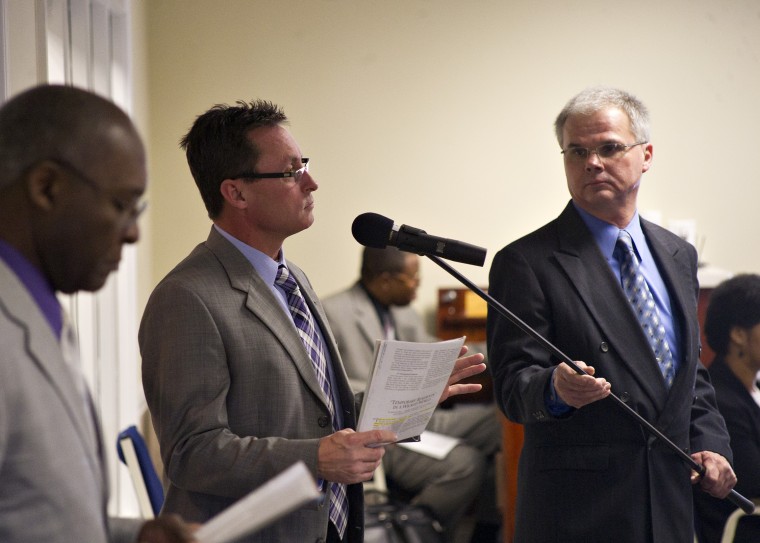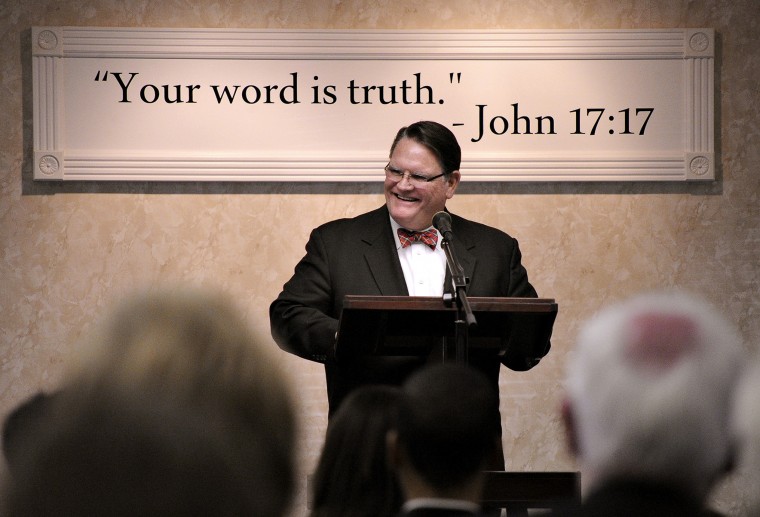At the age of 18, Rachel Walters already is a traveling minister. She's had the door slammed in her face. She's heard her share of slurs. A few people have answered their doors wearing nothing but a towel.
But it doesn't deter the young Jehovah's Witness from Bowling Green. Her belief is everything, she said.
"I like ... the preaching work," Walters said. "It gives us a chance to go out and bring our hope to other people."
It's that hope that drives Jehovah's Witnesses. They are a unique group, especially this year. During a time when conversations are buzzing about the upcoming presidential election - and religion is a big part of that discussion - Jehovah's Witnesses stay away from anything political.
They don't believe in government. They don't vote, join the military or wave the American flag. They don't celebrate holidays. They believe that trinities are evil.
It all goes back to their belief that the true government is God's kingdom, which will soon take over. Their beliefs stem from a strict interpretation of the Bible and the histories of certain events, such as holidays.
While it's a newer belief, about 500 Jehovah's Witnesses reside in Bowling Green, which is home to two meeting halls. About 30 years ago, one meeting hall in Park City served the entire area with an estimated 30 Jehovah's Witnesses, said Glen Pennington, an elder.
Now, about 150 people pack the smaller of the two Kingdom Halls. In the brick building on Mount Olivet Road, people are singing upbeat songs, discussing the Bible, reading their study guides and mapping out their door-to-door ministries.
In a tiny room, color-coded and numbered maps hang from the walls. It's where witnesses are assigned territories to cover.
When they're baptized, Jehovah's Witnesses become ordained ministers and are expected to travel to homes, briefly speaking to residents. There's no clergy, but appointed elders organize events at each meeting hall, Pennington said.
Pennington, of Bowling Green, has preached for decades. He's convinced many people to give Jehovah's Witnesses a try. And there are those who don't want to hear it.
He's encountered angry dogs and surly people. When he witnessed in New York, a group of ministers would travel to some of the most dangerous neighborhoods. They never shied away from an area, he said.
"Some people ... either they don't like people in general coming to their door or they may feel something about Jehovah's Witnesses that either they don't understand or want to deal with," he said. "So, we respect them."
In fact, there's one misconception about Jehovah's Witnesses that many agree is the biggest misunderstanding - the idea that they're not Christians. That's not true, they say.
While they don't believe in the Christian trinity of the Father, the Son and the Holy Ghost, they have a firm belief in Jesus Christ.
"We talk about Jehovah God, because that's God the father's name," said Tammy Walters, a Jehovah's Witness from Bowling Green. "But Jesus is his son. We believe his sacrifice is the key to our salvation."
They believe that Jesus is the head of God's heavenly government, which will soon rule the earth. When that happens, God's people will be resurrected from the grave and live again on earth, they claim.
"Many religions are heaven-oriented. That we're just here for a while, then we die and go to a better place," Pennington said. "We don't believe the Bible teaches that at all. The earth originally was man's home."
That doesn't mean they don't believe in a type of heaven. Heaven is where God is, where he rules from. Only a select few will go there. The rest will simply be resurrected to live again on earth, Pennington said.
They also don't believe in the traditional idea of hell - a place of fire and brimstone. The grave itself is the equivalent of hell, and the Bible compares death to sleep, not torment, they say.
Those who remain dead in their graves after the resurrection period will stay in hell, according to their beliefs.
"Everybody goes to hell when they die, even Jesus," said George Perry, an elder. "The Bible uses hell as a place to go when life ends, as we know it ... they're not tortured in hell fire. They just cease to exist."
They believe that people should continually work to stay in God's favor, so they try to be as unworldly as possible. Still, they partake in normal activities just like everyone else, they say.
They get married, have families, go to school, play sports. They even believe it's OK to drink alcohol, but in moderation. In fact, some Jehovah's Witnesses are alcoholics, Pennington said.
But they're different in other ways, most notably their refusal to celebrate holidays and birthdays. They believe many holidays are actually rooted in evil and are not biblical - not even Easter or Christmas.
"Christmas is simply not Christian," Pennington said. "There's nothing biblical (saying) to celebrate Christ's birth. Plus, Jesus was not born on Dec. 25."
Furthermore, some claim Christmas originally was a pagan holiday. It was first observed during a celebration to a sun god, said Banks Crandell, a Jehovah's Witness.
There are other misconceptions, Crandell claims, such as the idea that Jesus died on a cross. He was crucified, but not on a cross - the cross is actually a traditional pagan symbol, Crandell said.
"Jesus was never put on a cross," he said. "He was on a pole."
As for birthdays, there's nothing Christian about celebrating one's birth. Birthdays are mentioned in a few biblical scriptures, and each one happens during a terrible event, Jehovah's Witnesses claim.
For example, Herod was celebrating his birthday when he ordered the beheading of John the Baptist. Another scripture tells the story of Pharaoh, who celebrated his birthday by executing his chief baker, they say.
Some Jehovah's Witnesses say it was difficult to give up those celebrations after converting. Peggy Ashley, for example, researched the idea after studying to become a Jehovah's Witness, she said.
"Nothing was bad except Christmas," said Ashley, of Bowling Green. "We were brought up to believe in Christmas. When I started studying, I questioned that."
But for firm believers, such as Ashley, it's the only way to live. Many spend any spare time witnessing to others or studying, and some dedicate their lives to the ministry.
When 14-year-old Keagan Zachary graduates high school, getting a job is not the priority. Instead, she wants to attend pioneer school, where she will become a full-time Jehovah's Witness minister, she said.
Keagan, who is home-schooled, has already started her ministry. She travels door-to-door in an attempt to share her beliefs with others. It's always rewarding, but not always easy, she said.
"Sometimes it gets pretty ugly. Last month, a brother told me I was going to hell," Keagan said. "I tried to stay calm and not take it personally because they have their own beliefs."
But it doesn't deter the young Jehovah's Witness from Bowling Green. Her belief is everything, she said.
"I like ... the preaching work," Walters said. "It gives us a chance to go out and bring our hope to other people."
It's that hope that drives Jehovah's Witnesses. They are a unique group, especially this year. During a time when conversations are buzzing about the upcoming presidential election - and religion is a big part of that discussion - Jehovah's Witnesses stay away from anything political.
They don't believe in government. They don't vote, join the military or wave the American flag. They don't celebrate holidays. They believe that trinities are evil.
It all goes back to their belief that the true government is God's kingdom, which will soon take over. Their beliefs stem from a strict interpretation of the Bible and the histories of certain events, such as holidays.
While it's a newer belief, about 500 Jehovah's Witnesses reside in Bowling Green, which is home to two meeting halls. About 30 years ago, one meeting hall in Park City served the entire area with an estimated 30 Jehovah's Witnesses, said Glen Pennington, an elder.
Now, about 150 people pack the smaller of the two Kingdom Halls. In the brick building on Mount Olivet Road, people are singing upbeat songs, discussing the Bible, reading their study guides and mapping out their door-to-door ministries.
In a tiny room, color-coded and numbered maps hang from the walls. It's where witnesses are assigned territories to cover.
When they're baptized, Jehovah's Witnesses become ordained ministers and are expected to travel to homes, briefly speaking to residents. There's no clergy, but appointed elders organize events at each meeting hall, Pennington said.
Pennington, of Bowling Green, has preached for decades. He's convinced many people to give Jehovah's Witnesses a try. And there are those who don't want to hear it.
He's encountered angry dogs and surly people. When he witnessed in New York, a group of ministers would travel to some of the most dangerous neighborhoods. They never shied away from an area, he said.
"Some people ... either they don't like people in general coming to their door or they may feel something about Jehovah's Witnesses that either they don't understand or want to deal with," he said. "So, we respect them."
In fact, there's one misconception about Jehovah's Witnesses that many agree is the biggest misunderstanding - the idea that they're not Christians. That's not true, they say.
While they don't believe in the Christian trinity of the Father, the Son and the Holy Ghost, they have a firm belief in Jesus Christ.
"We talk about Jehovah God, because that's God the father's name," said Tammy Walters, a Jehovah's Witness from Bowling Green. "But Jesus is his son. We believe his sacrifice is the key to our salvation."
They believe that Jesus is the head of God's heavenly government, which will soon rule the earth. When that happens, God's people will be resurrected from the grave and live again on earth, they claim.
"Many religions are heaven-oriented. That we're just here for a while, then we die and go to a better place," Pennington said. "We don't believe the Bible teaches that at all. The earth originally was man's home."
That doesn't mean they don't believe in a type of heaven. Heaven is where God is, where he rules from. Only a select few will go there. The rest will simply be resurrected to live again on earth, Pennington said.
They also don't believe in the traditional idea of hell - a place of fire and brimstone. The grave itself is the equivalent of hell, and the Bible compares death to sleep, not torment, they say.
Those who remain dead in their graves after the resurrection period will stay in hell, according to their beliefs.
"Everybody goes to hell when they die, even Jesus," said George Perry, an elder. "The Bible uses hell as a place to go when life ends, as we know it ... they're not tortured in hell fire. They just cease to exist."
They believe that people should continually work to stay in God's favor, so they try to be as unworldly as possible. Still, they partake in normal activities just like everyone else, they say.
They get married, have families, go to school, play sports. They even believe it's OK to drink alcohol, but in moderation. In fact, some Jehovah's Witnesses are alcoholics, Pennington said.
But they're different in other ways, most notably their refusal to celebrate holidays and birthdays. They believe many holidays are actually rooted in evil and are not biblical - not even Easter or Christmas.
"Christmas is simply not Christian," Pennington said. "There's nothing biblical (saying) to celebrate Christ's birth. Plus, Jesus was not born on Dec. 25."
Furthermore, some claim Christmas originally was a pagan holiday. It was first observed during a celebration to a sun god, said Banks Crandell, a Jehovah's Witness.
There are other misconceptions, Crandell claims, such as the idea that Jesus died on a cross. He was crucified, but not on a cross - the cross is actually a traditional pagan symbol, Crandell said.
"Jesus was never put on a cross," he said. "He was on a pole."
As for birthdays, there's nothing Christian about celebrating one's birth. Birthdays are mentioned in a few biblical scriptures, and each one happens during a terrible event, Jehovah's Witnesses claim.
For example, Herod was celebrating his birthday when he ordered the beheading of John the Baptist. Another scripture tells the story of Pharaoh, who celebrated his birthday by executing his chief baker, they say.
Some Jehovah's Witnesses say it was difficult to give up those celebrations after converting. Peggy Ashley, for example, researched the idea after studying to become a Jehovah's Witness, she said.
"Nothing was bad except Christmas," said Ashley, of Bowling Green. "We were brought up to believe in Christmas. When I started studying, I questioned that."
But for firm believers, such as Ashley, it's the only way to live. Many spend any spare time witnessing to others or studying, and some dedicate their lives to the ministry.
When 14-year-old Keagan Zachary graduates high school, getting a job is not the priority. Instead, she wants to attend pioneer school, where she will become a full-time Jehovah's Witness minister, she said.
Keagan, who is home-schooled, has already started her ministry. She travels door-to-door in an attempt to share her beliefs with others. It's always rewarding, but not always easy, she said.
"Sometimes it gets pretty ugly. Last month, a brother told me I was going to hell," Keagan said. "I tried to stay calm and not take it personally because they have their own beliefs."















No hay comentarios.:
Publicar un comentario